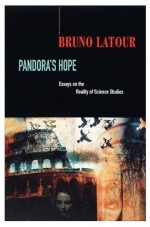Latouring: Philosophizing Realism
 In his book Pandora’s Hope: Essays on the Reality of Science Studies, Bruno Latour seems to be philosophizing about how different sciences conceive of reality, attempting to trace where we place our emphasis depending on the kind of science that we practice in academia. This is especially the case in his opening chapter, “Do You Believe in Reality? News from the Trenches of the Science Wars,” where he starts with the question that inspired the title of the chapter. His psychologist friend asked him this question while they were in an academic gathering in Brazil which united a larger number of scientists with a third of ‘science students’ that sparked in him a curiosity about disciplinary focus on reality, objectivity, mind, the abstract, human, nonhuman, and other categories. The clash between his psychologist friend and his philosophy background puzzled him to the point that he realized that “adding realism to science’ was actually seen by the scientists at this gathering, as a threat to the calling of science, as a way of decreasing its stake in truth and their claims to certainty” (3). Throughout the rest of the chapter he goes on to explore how this divide had occurred, and deeply questions each of the positions he deems relevant in the way.
In his book Pandora’s Hope: Essays on the Reality of Science Studies, Bruno Latour seems to be philosophizing about how different sciences conceive of reality, attempting to trace where we place our emphasis depending on the kind of science that we practice in academia. This is especially the case in his opening chapter, “Do You Believe in Reality? News from the Trenches of the Science Wars,” where he starts with the question that inspired the title of the chapter. His psychologist friend asked him this question while they were in an academic gathering in Brazil which united a larger number of scientists with a third of ‘science students’ that sparked in him a curiosity about disciplinary focus on reality, objectivity, mind, the abstract, human, nonhuman, and other categories. The clash between his psychologist friend and his philosophy background puzzled him to the point that he realized that “adding realism to science’ was actually seen by the scientists at this gathering, as a threat to the calling of science, as a way of decreasing its stake in truth and their claims to certainty” (3). Throughout the rest of the chapter he goes on to explore how this divide had occurred, and deeply questions each of the positions he deems relevant in the way.
He takes a detour to explain his misunderstanding with a colleague about disciplinary intent. This detour is important, he claims, in order to “measure the extraordinary form of radical realism that science studies has been uncovering” (4). From Descartes to Kant, to Phenomenology, to an exchange between Callicles and Socrates in Plato’s Gorgias, Latour is able to trace our values in an understanding of knowledge, or truth, in a brain-in-a-vat, social construction, Darwininstic survival of the fittest mentality respectively. Cynically, he questions “Why shout out of our mouths these two contradictory orders: ‘Be absolutely disconnected!’ ‘Find absolute proof that you are connected!’ Who could untangle such an impossible double mind?” (12). I am not doing any justice to the intricate historical account that he traces in reaching to the kind of modernist settlement that he critiques, but what I can do is pose his settlement to try to understand the kind of ‘realistic realism’ that he aims to posit.
“The modernist settlement. For science studies there is no sense in talking independently of epistemology, ontology, psychology, and politics–not to mention theology. In short, ‘out there,’ ‘nature’; ‘in there,’ the mind; ‘down there,’ the social; ‘up there,’ God. We do not claim that these spheres are cut off from one another, but rather that they all pertain to the same settlement, a settlement that can be replaced by several alternative ones.” (14)
In the diagram that he provides above this explanation he separates each of these components in the way that is described above. So, in his questioning of humanity, nonhumanity, objective reality and the Right and Might dichotomy, he aims to decipher how come to understand ourselves, and other things, in the world. His radical realism has made me ponder about “magical realism,” especially through the work of Gabriel Garcia Marquez, whose work I’ve read the most. The kind of political critique that he makes in mixing elements of fiction with that of his journalistic work in works such as “Amor en los Tiempos del Colera” or “Cronicas de una Muerte Anunciada” can be read as a study of an exploration of human experience within a specific context that was faced with a variety of hardships caused by people, but also bacteria that caused the cholera disease. Because Latour seems to be making a plea for interdisciplinarity, I take the opportunity to ask: can Marquez be considered a philosopher of realism? does the ‘magical’ component come from the element of fiction? If we are indeed valuing the work that comes from the brain-in-a-vat so consciously, then can we value fiction the same way? Does this mean that we could incorporate this kind of reading/writing in our classroom?